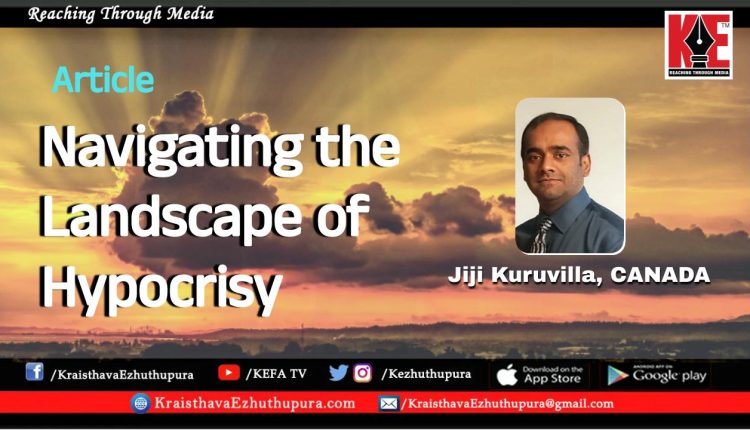Article: Navigating the Landscape of Hypocrisy | Jiji Kuruvilla, CANADA
The recent passing of a prominent leader, missionary, and visionary within the Christian community in Asia stirred a wave of mourning, yet it also revealed a glaring contradiction. While the flood of social media condolences and tributes flowed alongside photographs taken with the deceased while he was alive, it was hard to ignore the shift in attitude. Those who once wielded criticism and condemnation towards him now sang praises of his accomplishments and contributions to Christianity in India and across Asia. As someone who never had the privilege to interact with or meet the deceased, I was taken aback by this sudden change. Ah, the age-old dance of saying one thing and doing another. Truly, a masterpiece of human inconsistency
This abrupt shift raises eyebrows and prompts reflection on the authenticity of our expressions and the sincerity of our sentiments. Should we not have shown appreciation for this person while they were still among us? Let’s ponder the need for consistency in our words and actions, ensuring that our affirmations remain steadfast and our criticisms well-founded. After all, it’s better to remain silent than to speak insincerely and later retract our words.
In the fabric of our communities, sincerity and authenticity are threads that should weave through every interaction. As the apostle Paul admonished the Ephesians, “Therefore, putting away lying, ‘Let each one of you speak the truth with his neighbour,’ for we are members of one another” (Ephesians 4:25, NKJV). This charge emphasises the importance of honesty and integrity in our dealings with one another.
Yet, despite the biblical mandate to uphold truth, hypocrisy often lurks in the shadows, tarnishing the credibility of our testimony. Jesus’ harsh and critical rebuke to the scribes and Pharisees of his time echoes through the ages, “Woe to you, scribes and Pharisees, hypocrites! For you are like whitewashed tombs which indeed appear beautiful outwardly, but inside are full of dead men’s bones and all uncleanness” (Matthew 23:27, NKJV). This soul-piercing critique should resonate within us, serving as a constant reminder and warning against prioritising appearances over authenticity.
A common pitfall of hypocrisy is the habit of speaking ill of others behind their backs while donning a facade of friendship to their faces. As Solomon wisely warns in the book of Proverbs, “A perverse man sows strife, and a whisperer separates the best of friends” (Proverbs 16:28, NKJV). This proverb serves as a poignant reminder of the destructive power of gossip within our communities.
Furthermore, the temptation to judge others based on superficial criteria or preconceived notions is another snare we must avoid. Jesus’ instruction to his disciples echoes down the ages, “Judge not, that you be not judged. For with what judgement you judge, you will be judged; and with the measure you use, it will be measured back to you” (Matthew 7:1-2, NKJV). These words underscore the importance of humility and self-reflection in our dealings with others.
In addition to these challenges, we must resist the lure of self-centeredness and prioritise the welfare of others above our own interests. As Paul wrote to the Philippians, “Let nothing be done through selfish ambition or conceit, but in lowliness of mind let each esteem others better than himself” (Philippians 2:3, NKJV). This call reminds us of the sacrificial love embodied by Jesus Christ and challenges us to emulate his example in our relationships.
To combat the scourge of hypocrisy, we must foster a culture of sincerity and authenticity in our interactions. As John wrote in his first epistle, “Let us not love in word or in tongue, but in deed and in truth” (1 John 3:18, NKJV). This verse underscores the importance of aligning our actions with our professed beliefs, demonstrating genuine love and concern for others in both word and deed.
In these times, individuals must exercise caution and mindfulness in their words and actions. What may seem insignificant or trivial at the moment can have far-reaching consequences when brought to light. As believers, we are called to uphold principles of integrity, honesty, and transparency in all our dealings. Our conduct should reflect the values we profess, both publicly and privately.
We must also be aware that our words and actions are carefully scrutinized and stored in the minds of others, ready to be recalled and examined when needed. They become part of the collective memory of society, easily accessible in the age of technology and social media. Therefore, let us be vigilant in guarding our words and actions, knowing that they carry weight and significance in the eyes of others and, ultimately, in the eyes of God. Let’s be careful.
In conclusion, the issue of hypocrisy within our communities is a multifaceted challenge that requires introspection and concerted effort. By embracing sincerity and authenticity as guiding principles, we can cultivate greater unity, trust, and mutual respect within the body of Christ. Let us heed the wisdom of Scripture and strive to live lives marked by integrity and genuineness, shining as beacons of light in a world often clouded by duplicity and deceit.






- Advertisement -





